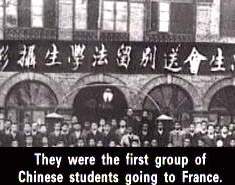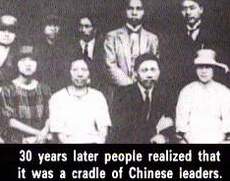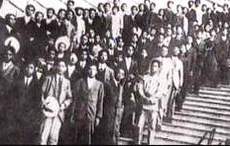 |
|
Songs of Youth (5)
Going to France for Work-Study Programmes |
| CCTV.COM 2002-11-21 15:11:46 |
|
 Around the May 4th Movement, the dock at the bund in Shanghai was a hub of activity. On March 17, 1919, a total of 89 Chinese students boarded a ship here to take a voyage. In less than two years up to December 1920, nearly two thousand young people traveled across the ocean to study in France. Around the May 4th Movement, the dock at the bund in Shanghai was a hub of activity. On March 17, 1919, a total of 89 Chinese students boarded a ship here to take a voyage. In less than two years up to December 1920, nearly two thousand young people traveled across the ocean to study in France.
In those days, France had just been freed from the nightmare of World War I. The country was in a process of recovery. But with its fine cultural tradition and romantic appeal, it was a magnet for Chinese youth. Besides, less money was charged than in other countries for Chinese students studying in France. Many young Chinese students dreamed of going to France for work-study programmes.
These students came from 19 provinces, especially Sichuan and Hunan.
Eighteen-year-old Chen Yi and 16-year-old Deng Xiaoping left their hometowns in Sichuan one after the other to take their journeys to France.
In March 1919, Mao Zedong hurried from Beijing to Shanghai to say goodbye to Cai Hesen and other members of the Society of the New Masses before they took their voyage to France.
For many days Mao Zedong bustled about to organize the voyage to France, but he gave up such a chance for himself over and over again. It seemed that the fast-changing situation at home had greater attraction for him.
Zhou Enlai was kept in custody at the detention house of the Tianjin Procurator's Office. On June 8, 1920, he wrote a poem and presented it to his fellow students who would soon leave for France.
The poem goes,
"Go abroad through the East China Sea, the South China Sea, the Red Sea and the Mediterranean.
 Waves are surging forward, carrying you to the coast of France, the homeland of freedom." Waves are surging forward, carrying you to the coast of France, the homeland of freedom."
After he was released from the detention house, 22-year-old Zhou Enlai followed this route to France. He had wished to go there for a long time.
On May 4, 1920, students on the way to France gathered to mark the first anniversary of the May 4th Movement.
They sang the national anthem. They believed that the May 4th Movement was an important mark of young people entering the political arena.
Marseilles, a port city in the south of France, was the first leg of the Chinese students' journey to the Republic of France. It was here that they scattered to various parts of the country to find jobs at factories. The Chinese students worked under hard conditions on the French territory with an area of more than 500,000 square kilometres.
After their arrival in Europe for the first time, they were impressed by its developed economy and culture as well as the turbulence and social crisis after the war. Most of the Chinese students came from poor families, so they had to work part-time to support themselves.
Zhou Enlai and a few others did not go to factories. He wrote essays for newspapers in China to support himself. Recommended by Zhang Shengpu and Liu Qingyang, he joined the Communist Party of China in 1921.
A communist organization of Chinese students in Europe was formed in June 1922. It was named "the Chinese Youth Communist Party in Europe".
 Sixteen-year-old Deng Xiaoping was once a fitter at Renault, a French car manufacturer. His archives there can still be seen today. After World War I, Chinese intellectuals began to doubt the development of capitalism. This caused great changes that took place in the realm of ideology after the May 4th Movement. A number of people became communists. Sixteen-year-old Deng Xiaoping was once a fitter at Renault, a French car manufacturer. His archives there can still be seen today. After World War I, Chinese intellectuals began to doubt the development of capitalism. This caused great changes that took place in the realm of ideology after the May 4th Movement. A number of people became communists.
Outstanding figures like Zhou Enlai, Cai Hesen, Deng Xiaoping, Wang Ruofei, Chen Yi, Zhao Shiyan and Nie Rongzhen emerged from these students. In the following dozens of years, they became pillars of strength to the Communist Party of China and founders of the People's Republic of China.
|
|
Editor: Inner Wu CCTV.com
|
|
|
|
|
|
 |









